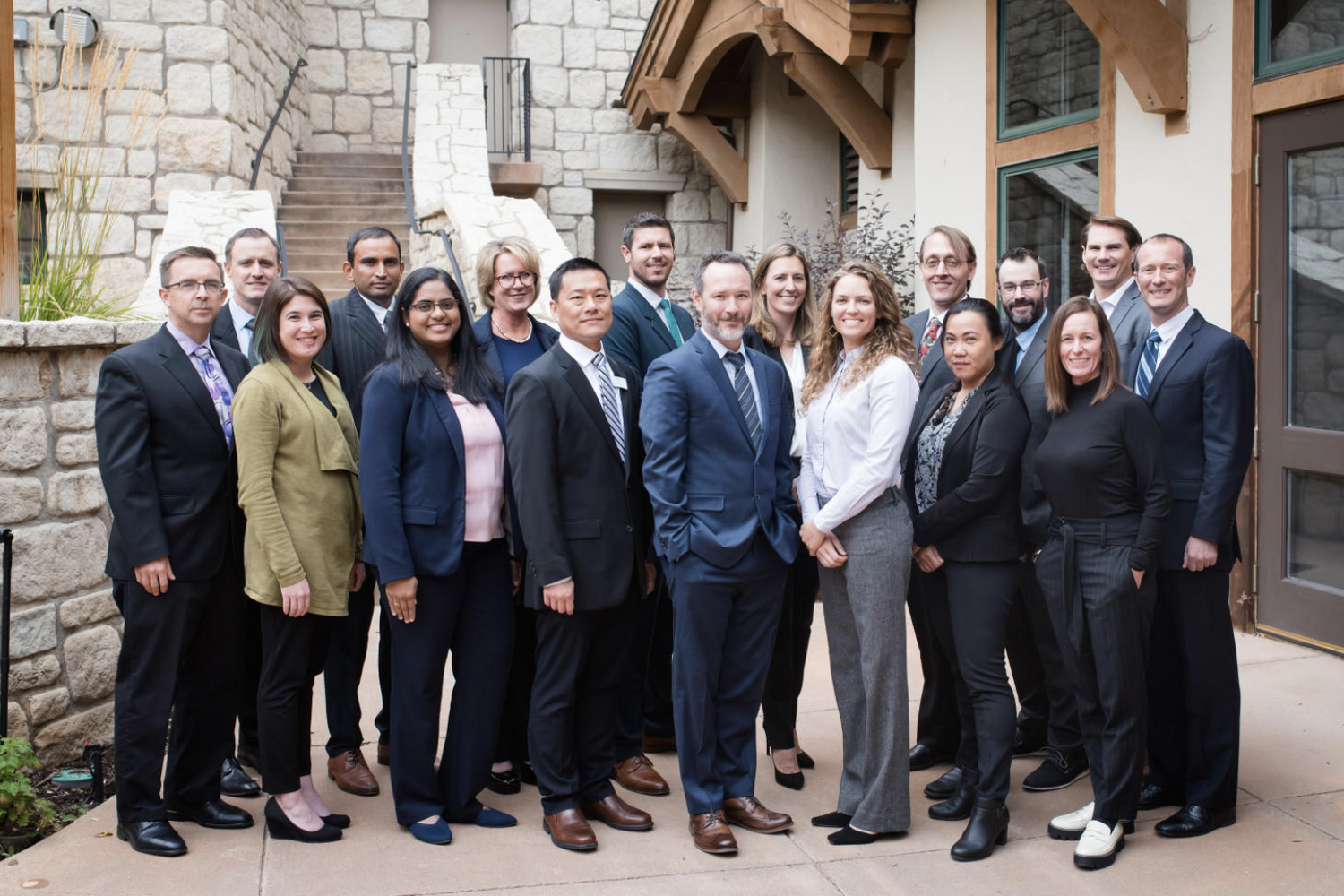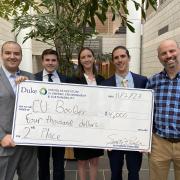Jul. 23, 2015
 BOULDER, COLORADO – On a Friday morning in July of 2012, Rob Slowinski (MBA’12) steadied his nerves and took an important step towards a goal that had intrigued him throughout his professional career. Despite a meaningful position at an engineering consulting firm, Rob quit his job in order to answer the call of entrepreneurship. He would soon find a channel for his passion, and in less than a year would go on to co-found his first venture, Groundwork Labs, LLC (“Groundwork”). But as with most startup stories, the journey is just as interesting as the destination.
BOULDER, COLORADO – On a Friday morning in July of 2012, Rob Slowinski (MBA’12) steadied his nerves and took an important step towards a goal that had intrigued him throughout his professional career. Despite a meaningful position at an engineering consulting firm, Rob quit his job in order to answer the call of entrepreneurship. He would soon find a channel for his passion, and in less than a year would go on to co-found his first venture, Groundwork Labs, LLC (“Groundwork”). But as with most startup stories, the journey is just as interesting as the destination.

Leeds alumnus and
Groundwork co-founder,
Rob Slowinski (MBA’12)
IDEATION
Soon after resigning, and only months removed from completing the MBA program at the University of Colorado Boulder’s Leeds School of Business (“Leeds”), Rob had ample free time. So he did what any aspiring entrepreneur with unprecedented schedule flexibility and a limited budget would do – he traveled to Brazil for a month.
“Honestly, I just needed to relax and clear my head,” Rob mused. “I learned so much from working in a corporate setting, but I also found it difficult at times to cultivate my creativity. The time off was liberating, and also necessary for ideation.”
During this period of exploration and brainstorming, Rob circled back to familiar topics such as green building, sustainable energy and design consulting. In his prior role as a staff engineer, Rob helped to coordinate green building design charrette workshops for college students. His employer had been contracted by regional energy utilities to facilitate workshops on their behalf in order to inspire future engineers and architects in their service territories. Candidates were typically students from nearby universities, who formed groups to compete in case competitions that were judged by local industry professionals. With each workshop, Rob’s team usually noticed a few exceptional students who stood out amongst their peers.
“I attribute this great reveal that we observed to the delightfully frenetic atmosphere that we created. There wasn’t anything exclusive to engineering or architecture that brought out the best in these students. But rather, it was working with new information, teamwork, competition, time-stress and presentations,” Rob explained. “Although our goal for the workshops was to educate rather than to hire, we were always able to identify a handful of individuals who we knew would fit in exceptionally well at our company, and they wanted to work for us too.”
So it occurred to Rob that this workshop environment could be applied to corporate hiring across industries. To explore this idea further, Rob became a regular at Impact Hub Boulder (“Impact Hub”). Impact Hub is a global network of coworking spaces – one of which is located in downtown Boulder – open to any impact-oriented entrepreneurs looking for office space and like-minded peers. Members often network and collaborate with each other to transform their ideas into viable businesses. Soon Rob began attending Impact Hub’s Thursday morning ‘coffee colliders,’ in which attendees pitch their ideas and offer their expertise to the group.
“It’s motivating to be in the presence of people who are getting things done,” Rob admitted. “Impact Hub gave me the confidence and the momentum to get up and do it, even before formalizing business plans and other organizational requirements.”
Impact Hub also provided Rob with his future business partner. Peter Waters, a local enterpriser and ideator, was in attendance the week that Rob discussed his ‘workshop’ idea. The two quickly got together to expand upon these preliminary thoughts and build a framework around experiential hiring consulting. By June of 2013, Groundwork was born.
THE PREMISE
With a tagline of ‘redesigning the job interview,’ Groundwork provides an alternative hiring experience in which employers analyze job-seekers’ qualitative abilities through dynamic workshops. These collaborative environments use team-based problem-solving, design-thinking and game theory to isolate the exact competencies that employers seek in prospective hires. Empirical observation provides insights far beyond those gleaned from resumes or brief sit-down interviews, ultimately reducing the risks associated with making unsuitable hires.
Rob explained that the traditional interview process often consists of several phases. First, the open position is posted in order to solicit applications. Next, the hiring team reviews resumes to identify a subset of qualified applicants for interviews by phone or in-person. Then, the leading candidates are invited to more thorough in-person interviews. Finally, the hiring team extends an offer to its top candidate. Groundwork’s aim is to enhance the process, particularly through accelerating the practice of deciding who merits a second look.
For example, let’s assume that Groundwork is engaged by a technology company to staff a newly formed Director of Sales role. After meeting with Groundwork to discuss the company’s culture, as well as specific traits and competencies required of the position, the hiring team invites a number of its candidates to participate in Groundwork’s interactive program. Groundwork’s custom workshops, facilitated by both Rob and Peter, are built around real-life dilemmas, group problem-solving and other fast-paced and often unexpected activities. In this scenario, situational games such as story-telling exercises are interspersed to stimulate characteristics desirable for a salesperson, such as influence and charisma.
Since job applicants are so motivated to succeed while playing the ‘game,’ they tend to forget that they are even interviewing at all. The normal customs of politeness and pleasantries may be abandoned in the heat of the moment, and what is left is a telling glimpse – good or bad – of what it would be like to actually work with each applicant. Since these activities highlight more than what can be seen at first glance, the hiring team is provided with an ‘observer’s guide’ noting specific themes to focus on during the exercises. Upon conclusion of the workshop, the employer identifies a few leading candidates to further pursue. Even if the hiring team cannot explicitly verbalize what they are looking for in a new hire, experience says that they know it when they see it.
LEEDS’ INFLUENCE
The symbiotic relationship between CU’s academic incubator and Boulder’s sophisticated startup scene has aided countless Leeds graduates over the years. Rob too has benefited from associations with school and community alike, which have created meaningful intersections for him both professionally and personally. For example, Rob cited an MBA entrepreneurship course taught by Professor George Deriso, in which local enterprisers were periodically invited to class to share their experiences. So it should come as no surprise that, given Rob’s current career path, many of these guest speakers are now his peers.
“I really appreciated the entrepreneurial avenues available to me as a Leeds student,” Rob said. “The opportunity to interact with business leaders within the community helped me to integrate into the Boulder startup environment.”
While still an MBA student, Rob took advantage of one of the many case-competitions hosted by the university. With the Groundwork idea still in its early stages, Rob entered his business plan into CU’s New Venture Challenge (“NVC”). The NVC is a campus-wide entrepreneurship competition that serves as a ‘flight simulator’ for new business ideas, bringing faculty, staff, undergraduates and graduate students together. The experience allowed Rob to gain feedback that would prove to be invaluable in the coming years.
Since co-founding Groundwork, Rob’s ties to the University of Colorado have only become stronger. Shortly after its launch, Groundwork hosted a job fair sponsored jointly by Leeds’ Deming Center for Entrepreneurship, and the Net Impact club, a student-led organization on campus. With over 40 students and multiple employers in attendance, this was Groundwork’s largest stage yet. Their presence spiced up an otherwise mundane routine of students standing in long lines just to get three minutes to shake hands with corporate recruiters.
More recently, the Leeds MBA Alumni Board invited Groundwork to participate in its speaker series. The session was titled “Game Theory and Design Thinking: Innovative Strategy and Management Tools for Doing Smarter Business,” and was hosted at a downtown Boulder restaurant. The event used very short exercises to briefly sample some of the techniques and strategies often found in Groundwork’s workshops. Rob relished the chance to explain his business model to Leeds graduates, while receiving feedback on how it may be applied to their fields of work.
BEGINNINGS
A native of Appleton, Wis., Rob honed his technical skills early as an undergraduate mechanical engineering major at the University of Wisconsin-Madison. He moved to Boulder upon graduation, largely drawn to the community’s passion for sustainability. He joined a sustainable design consulting firm and simultaneously pursued a Master’s degree in Architectural Engineering from CU’s College of Engineering & Applied Science.
“Not only did Boulder incorporate many of the exact fields that I was interested in, but it also provided opportunities to turn those interests into businesses,” Rob said. “It was the perfect combination of what I was looking for in my career.”
Despite two engineering degrees and a job in an industry that he was passionate about, Rob enrolled in Leeds’ MBA program to gain the business acumen that he would need in order to run his own company. Now with Groundwork, this intuition and formal education have served him well.
FUTURE PLANS
To date, Groundwork has led workshops for a variety of firms in disparate industries such as management consulting, online marketing and craft brewing. In a great example of the productive collisions that occur at Impact Hub, one of Groundwork’s first engagements was with Impact Hub itself, which led to the hiring of two workshop participants as community curator hosts.
“We cater towards the traits that you need in a new hire, rather than any specific industry, since companies of all types aim to hire the right people,” Rob said. “If you need a good communicator, a team player or a problem-solver, we can help identify that for you. But we are finding that startups are most interested in our services, likely because they face a variety of challenges and because they are usually more receptive to creative hiring practices.”
A self-described ‘details and operations’ guy, Rob’s daily activities are quite varied. He leads Groundwork’s marketing, sales and business development initiatives, while also maintaining the website and all media content. He continues to attend entrepreneur meet-up events and seeks speaking opportunities with professional groups to promote the Groundwork brand. To that point, the company is exploring many new products and services, including:
- Licensing workshops to affiliates in other major cities
- Publishing do-it-yourself hiring guides for specific industries such as restaurants and retail
- Consulting services to advise companies on improving their own hiring practices
These new initiatives reiterate the wisdom of group-games to highlight character traits that maximize positional needs. And with all of this work to be done, Rob may be too busy to get back to Brazil any time soon.
CONTACT
For more information on Groundwork, please visit the company’s website or contact Rob Slowinski directly atrob@groundwork.jobs.
- - - - - - - - - - - - - - - - - - - - - - - - - - - - - - - - - - - - - - - - - - - - - - - -
About the Blogger:
Timothy Bracken (MBA’11) is a Leeds alumnus and contributor to the school’s blog, focusing on startups founded by Leeds alumni. He lives in Highlands Ranch, Col., with his wife Kathleen and daughter Lindsey. You may contact him at tmbracken2@gmail.com.







